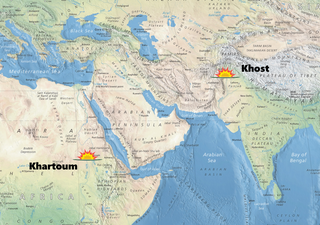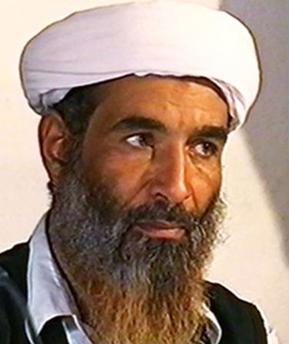
Osama bin Mohammed bin Awad bin Laden was a Saudi Arabian-born Islamist dissident and militant leader who was the founder and first general emir of al-Qaeda from 1988 until his death in 2011. Ideologically a pan-Islamist, he participated in the Afghan jihad against the Soviet Union and supported the activities of the Bosnian mujahideen during the Yugoslav Wars. Bin Laden is most widely known as the mastermind behind the September 11 attacks in the United States.

Mullah Muhammad Omar was an Afghan mujahideen commander, revolutionary, and the cleric who founded the Taliban. During the Third Afghan Civil War, the Taliban fought the Northern Alliance and took control of most of the country, establishing the First Islamic Emirate for which Omar began to serve as Supreme Leader in 1996. Shortly after al-Qaeda carried out the September 11 attacks, the Taliban government was toppled by an American invasion of Afghanistan, prompting Omar to go into hiding. He successfully evaded capture by the American-led coalition before dying in 2013 from tuberculosis.
The following lists events that happened during 2001 in Afghanistan.

Ayman Mohammed Rabie al-Zawahiri was an Egyptian-born pan-Islamist militant and physician who served as the second general emir of al-Qaeda from June 2011 until his death in July 2022.

Mohamed Salah al-Din al-Halim Zaidan, commonly known by his nom de guerreSaif al-Adel, is a former Egyptian Army officer and explosives expert who is widely understood to be the de facto leader of al-Qaeda. Al-Adel fought the Soviets as an Afghan Arab before becoming a founding member of the al-Qaeda organization. He is a member of Al-Qaeda's Majlis al-Shura and has headed the organization's military committee since the death of Muhammad Atef in 2001. He is currently known to live in Iran along with several other senior members of the group.

Operation Infinite Reach was the codename for American cruise missile strikes on al-Qaeda bases that were launched concurrently across two continents on 20 August 1998. Launched by the U.S. Navy, the strikes hit the al-Shifa pharmaceutical factory in Khartoum, Sudan, and a camp in Khost Province, Afghanistan, in retaliation for al-Qaeda's August 7 bombings of American embassies in Kenya and Tanzania, which killed 224 people and injured over 4,000 others. Operation Infinite Reach was the first time the United States acknowledged a preemptive strike against a violent non-state actor.

Tayseer Allouni is a journalist from the Al Jazeera news channel. He was born in Deir ez-Zor in Syria in 1955 then in 1983 he moved to Spain, where he studied Economics, and has lived there ever since, adopting Spanish citizenship in 1988. He interviewed Osama bin Laden following the September 11, 2001 attacks on the World Trade Center, and was controversially convicted on terrorism-related charges in Spain in 2005.
The 055 Brigade was a guerrilla organization loyal to Osama bin Laden that was sponsored and trained by al-Qaeda, and was integrated into the Taliban between 1996 and 2001.
Osama bin Laden, the founder and former leader of al-Qaeda, went into hiding following the start of the War in Afghanistan in order to avoid capture by the United States and/or its allies for his role in the September 11 attacks, and having been on the FBI Ten Most Wanted Fugitives list since 1999. After evading capture at the Battle of Tora Bora in December 2001, his whereabouts became unclear, and various rumours about his health, continued role in al-Qaeda, and location were circulated. Bin Laden also released several video and audio recordings during this time.

The 1996–2001 Afghan Civil War, also known as the Third Afghan Civil War, took place between the Taliban's conquest of Kabul and their establishing of the Islamic Emirate of Afghanistan on 27 September 1996, and the US and UK invasion of Afghanistan on 7 October 2001: a period that was part of the Afghan Civil War that had started in 1989, and also part of the war in Afghanistan that had started in 1978.

The Battle of Tora Bora was a military engagement that took place in the cave complex of Tora Bora, eastern Afghanistan, from November 30 – December 17, 2001, during the final stages of the United States invasion of Afghanistan. It was launched by the United States and its allies with the objective to capture or kill Osama bin Laden, the founder and leader of the militant organization al-Qaeda. Al-Qaeda and bin Laden were suspected of being responsible for the September 11 attacks three months prior. Tora Bora is located in the Spīn Ghar mountain range near the Khyber Pass. The U.S. stated that al-Qaeda had its headquarters there and that it was bin Laden's location at the time.

Hamza bin Osama bin Mohammed bin Awad bin Laden, better known as Hamza bin Laden, was a Saudi Arabian-born member of al-Qaeda. He was a son of al-Qaeda leader Osama bin Laden, and, following his father's death in 2011, he was described as an emerging leader of the al-Qaeda organization.

Several sources have alleged that the Central Intelligence Agency (CIA) had ties with Osama bin Laden's faction of "Afghan Arab" fighters when it armed Mujahideen groups to fight the Soviet Union during the Soviet–Afghan War.
Osama bin Laden, a militant Islamist and co-founder of al-Qaeda, in conjunction with several other Islamic militant leaders, issued two fatawa – in 1996 and then again in 1998—that military personnel from the United States and allied countries until they withdraw support for Israel and withdraw military forces from Islamic countries. He was indicted in United States federal court for his alleged involvement in the 1998 U.S. embassy bombings in Dar es Salaam, Tanzania and Nairobi, Kenya, and was on the U.S. Federal Bureau of Investigation's Ten Most Wanted Fugitives list until his death.
Regional and tribal Afghan leaders rose up and formed an alliance known as the Eastern Shura to oust the Taliban in Khowst Province and Nangarhar Province, during the War in Afghanistan. Mary Anne Weaver, writing in The New York Times on the fourth anniversary of al Qaeda's attacks on September 11, 2001, described the formation of the Eastern Shura as the result of surrender negotiations on November 13, 2001, between Mohammad Yunus Khalis and Osama bin Laden.

Kabul, capital of Afghanistan, fell in November 2001 to the Northern Alliance forces during the War in Afghanistan. Northern Alliance forces began their attack on the city on 13 November and made swift progress against Taliban and Al-Qaeda forces that were heavily weakened by American and British air strikes. The advance moved ahead of plans, and the next day the Northern Alliance forces entered Kabul and met no resistance inside the city. Taliban forces retreated to Kandahar in the south.
United Nations Security Council resolution 1390, adopted unanimously on 16 January 2002, after recalling resolutions 1267 (1999), 1333 (2000), 1363 (2001), 1368 (2001), 1373 (2001) 1378 (2001) and 1383 (2001) concerning the situation in Afghanistan and terrorism, the Council imposed further sanctions on Osama bin Laden, Al-Qaeda, the Taliban and others associated with them.

Mohammed Atef was an Egyptian militant and prominent military chief of al-Qaeda, and a deputy of Osama bin Laden, although Atef's role in the organization was not well known by intelligence agencies for years. He was killed in a US airstrike in November 2001.
The following is an outline of the series of events that led up the War in Afghanistan (2001–2021).











